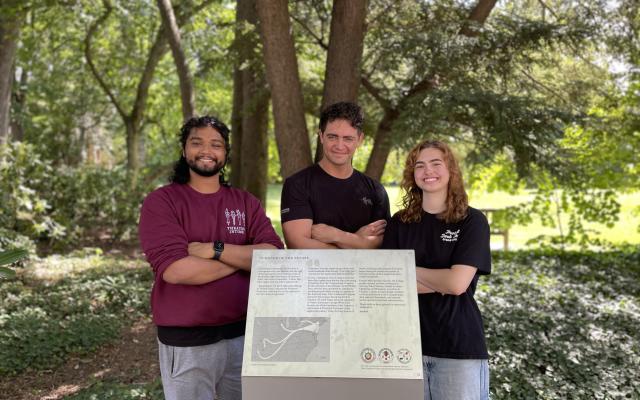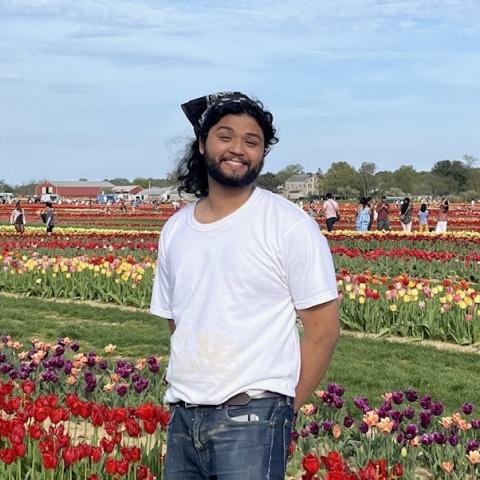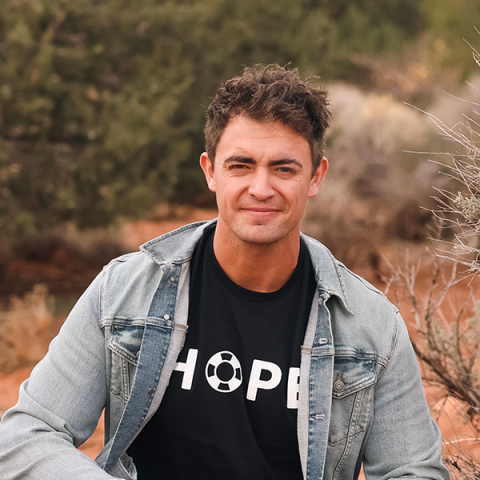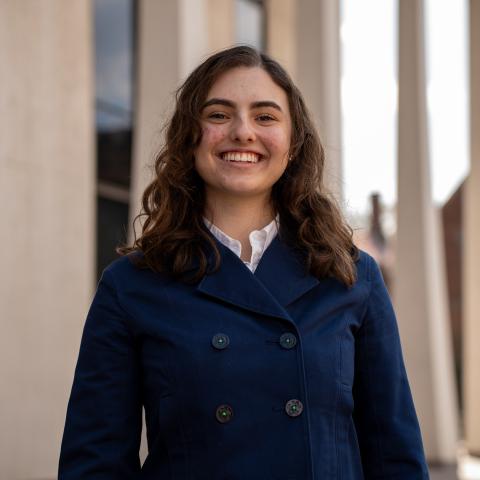
Ammon Love is a lifelong gamer and cinephile who comes from a culture rich in storytelling: the Cherokee Nation and the Lenape People. So, it comes as no surprise that when he and his fellow teammates founded Lovestruck Games, the narrative would revolve around the history, culture, and languages of his ancestors.
“It always seemed sad to me, the representation of Native culture as one oversimplified conglomerate, often with stereotypes formed inside of Hollywood,” said Love. “With emerging technologies that allow us to recreate photorealistic and immersive 3D worlds, I see it as a tremendous opportunity to fill that gap with our tribes’ rich history, language, heroes, and mythologies in a way that honors the spirit of their struggle and survival.”
Love, a major in Public and International Affairs and a member of the Delaware Tribe of Indians, is leading development on a 3D action-adventure game set in pre-colonial and early colonial New York/New Jersey, the homeland of the Lenape people. The project combines historical research, Indigenous languages, and immersive game mechanics to deliver a profoundly human and culturally grounded narrative experience.
He is not working alone. Fellow gaming enthusiast and Art & Archaeology major Sahaf Chowdhury, along with budding entrepreneur and Computer Science major Gabrielle Ross, have joined forces with him to build a game that not only entertains but also challenges mainstream assumptions about Native history and culture.
Gabrielle Ross, a Computer Science major with extensive experience in full-stack development, brings deep technical expertise to the project. “What excites me most is how our team’s diverse specialties—across art, storytelling, and technology—combine to tackle the multi-layered challenge of photo-realistic game development. It’s a powerful dynamic,” said Ross.
Chowdhury shares that passion for creative fusion. “Seeing the opportunity to contribute to a form of art in the gaming space just felt like a perfect collaboration of all my interests—animation, theater, art, and design,” he said. “I’m excited to demonstrate that video games don’t have to be just simple entertainment but can be an art form in and of themselves. I wanted to be a part of this startup to see what I'm capable of when tackling such a complex project.”
As the project grows, the team plans to involve more members of the Delaware Tribe to contribute voices, performances, and linguistic expertise, creating opportunities for community engagement in both cultural preservation and creative storytelling. “Our tribe’s history is filled with periods of peace, of war, of survival and deep humanity,” said Love. “These are the stories we want to tell—through characters who speak our languages, embody our values, and show the complexity of our people.”
As participants in the Keller Center’s eLab Summer Accelerator program, the team gains access to invaluable resources that are helping them advance their project. The program offers tailored mentorship, workshops, and peer networking opportunities, empowering the Lovestruck Games team to refine their narrative, gameplay, and business models. This supportive environment is accelerating their progress and preparing them for future funding rounds, positioning the startup to make a significant impact in the gaming and cultural preservation spaces.
The team has significantly benefited from the mentorship of Shahram Hejazi, Keller’s Entrepreneurship Specialist, whose guidance has helped shape the team’s business development strategy. “Lovestruck is driven by a passionate team with a clear vision and united by a strong belief: that games can be both wildly entertaining and a transformative tool to share cultural experiences,” said Hejazi. His support has been instrumental as the team navigates the challenges of game development, cultural storytelling, and entrepreneurship.
Although the project is framed as a historical fiction game, Love sees it as more than just entertainment. “At a minimum, we hope it serves as a powerful entry point for people to explore our history more deeply—and ideally, to reach out to our cultural directors and tribal historians. But we also hope it inspires others in our communities to take up their own roles in cultural preservation and storytelling.”
With Lovestruck Games, they aim to transform the way Indigenous stories are told by centering Native voices and creating worlds that reflect the truth and beauty of their heritage.



